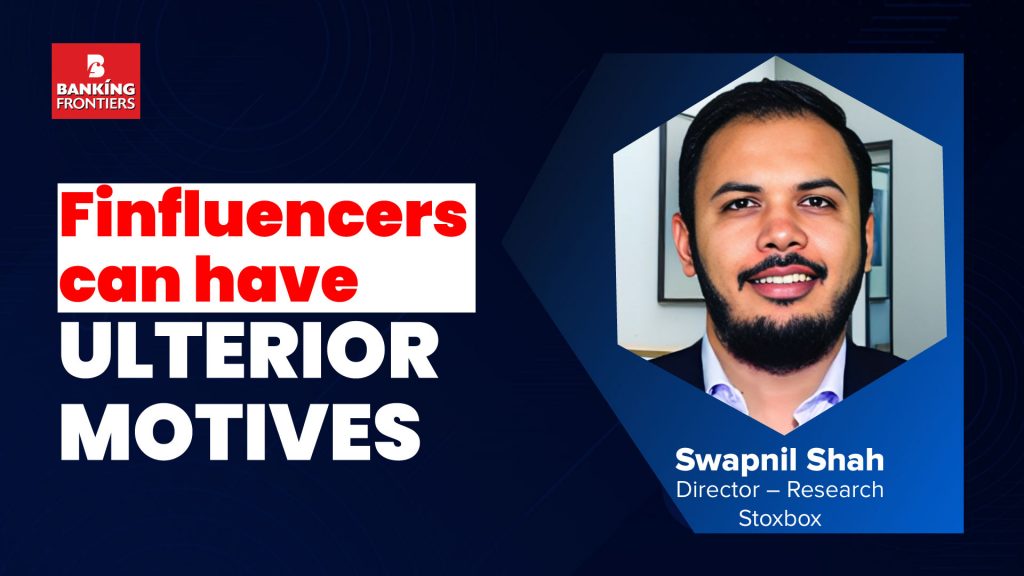Swapnil Shah, Director – Research at Stoxbox, has nearly a decade of experience in research and investment. He discusses finfluencer’s role in the light of SEBI’s fresh guidelines:

The poster boys of yesterday were majorly from the fraternity of films, sports, art, social life, and academics. Times have changed now and so have the poster boys. The growing influence of social media has created online personalities and they are from a variety of spheres including fitness, finance, personality development, travel, cooking, etc. Most of them use popular platforms such as Telegram, WhatsApp, YouTube, Twitter, Facebook, etc, to promote their content.
One of the growing social media influencers is from the financial field and this popularity is reasoned, traced to the covid-19 period, which saw many people getting hooked to the financial world of investing and trading in stock markets. A study released by SEBI earlier this year showed that retail investors in India’s futures and options markets rose by 500% in the FY2019-22 period, with 90% of these investors losing money. A financial influencer (finfluencer) is someone who shares their expertise on a range of financial topics including stock markets, personal finance, financial asset planning, mutual funds, etc, with their followers on varied social media platforms.
Swapnil Shah, Director, Research, Stoxbox alerts: “All that glitters is not gold and the same goes for these online stars as well. It is disheartening to see financial influencers exploiting their reach/influencing power for their ulterior motives as evidenced by the recent pump and dump scheme exposed by SEBI. One has to be prudent enough to ensure that he/she does not fall prey to the ill-advice and repent later.”
Consumers Beware
Though all the free advice/stock tip looks very tempting, investors must take this with a pinch of salt as all are not created equal. It is important to note that while financial advice is good in general, but works best if it is tailored to individual needs.
Moreover, the audience should consume the free social media content with an information mindset rather than assimilating it as a piece of financial advice. It is advisable to tread with caution and understand that these individuals may not have the best of your interests in mind all the time. Swapnil argues: “Today’s digital age of viral tweets and trending reels come with its own set of challenges. Lack of sufficient experience and sub-par educational qualification may be other cohorts that may affect the quality of advice by these finfluencers. Investor can avoid trap by doing proper due diligence/research on the given advice and ensuring regulatory compliance of the advisor (certified financial planners, SEBI registered).”
Govt: No Outlandish Fin Claim
The government has become vigilant and has sounded caution to the general public, especially considering the recent remarks by the Finance Minister, Nirmala Sitharaman, on finfluencers and ponzi apps. She advised that a strong sense of caution is required in each one of us to make sure we double-check and counter-check the given advice. She also indicated that the government is not considering any proposal to regulate financial influencers on social media, but is coordinating with the RBI and MEITY to check ponzi apps that are making outlandish financial claims. Swapnil indicates: “Regulatory bodies such as SEBI have an important role to play here and ensure that strict actions are taken against those who are found involved in fraudulent activities. Financial advisors, who are not registered with SEBI, violate the regulatory norms and can be held liable for violating the Prohibition of Fraudulent and Unfair Trade Practices regulations.”
A Fine Balance, The Way Forward
Though regulations for finfluencers per se are not there currently, Swapnil believes that it would be definitely on the cards soon amid the rising cases of the general public falling prey to these advices. In a fair bid to protect the general public interests, the government should ensure that it preserves the freedom of speech and the ability of individuals to share their financial opinions and experiences on social media platforms. He feels: “It would be prudent from the regulator and government perspective to talk, hear and take into confidence the content creators and other stakeholders to arrive at a mutual consensus regarding the regulation governing them. There is a fine line between financial literacy and financial advice and all efforts should focus on building an investment culture which is a win-win situation for both the financial content creator and the audience.”
Read more:
The transitioning of a wealth advisor








